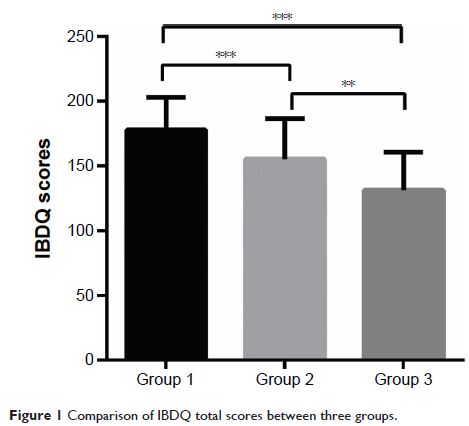109568
论文已发表
注册即可获取德孚的最新动态
IF 收录期刊
- 3.4 Breast Cancer (Dove Med Press)
- 3.2 Clin Epidemiol
- 2.6 Cancer Manag Res
- 2.9 Infect Drug Resist
- 3.7 Clin Interv Aging
- 5.1 Drug Des Dev Ther
- 3.1 Int J Chronic Obstr
- 6.6 Int J Nanomed
- 2.6 Int J Women's Health
- 2.9 Neuropsych Dis Treat
- 2.8 OncoTargets Ther
- 2.0 Patient Prefer Adher
- 2.2 Ther Clin Risk Manag
- 2.5 J Pain Res
- 3.0 Diabet Metab Synd Ob
- 3.2 Psychol Res Behav Ma
- 3.4 Nat Sci Sleep
- 1.8 Pharmgenomics Pers Med
- 2.0 Risk Manag Healthc Policy
- 4.1 J Inflamm Res
- 2.0 Int J Gen Med
- 3.4 J Hepatocell Carcinoma
- 3.0 J Asthma Allergy
- 2.2 Clin Cosmet Investig Dermatol
- 2.4 J Multidiscip Healthc

超越疾病活动之外:焦虑和医疗经济负担对炎症性肠病患者与健康相关的生活质量的影响
Authors Luo XP, Mao R, Chen BL, Qiu Y, Zhang SH, He Y, Chen J, Zeng ZR, Ben-Horin S, Chen MH
Received 1 August 2016
Accepted for publication 31 October 2016
Published 22 December 2016 Volume 2017:11 Pages 23—31
DOI https://doi.org/10.2147/PPA.S118589
Checked for plagiarism Yes
Review by Single-blind
Peer reviewers approved by Dr Lucy Goodman
Peer reviewer comments 3
Editor who approved publication: Dr Naifeng Liu
Purpose: Many patients with inflammatory bowel disease (IBD) have impaired
health-related quality of life (HRQOL). The influence of psychological and
economic factors on HRQOL has not been fully elucidated in IBD. Therefore, we
aimed to identify the predictors of HRQOL in an IBD cohort.
Patients and
methods: This was a cross-sectional cohort study of patients presenting to our
tertiary IBD center. HRQOL was measured using the 36-item Short Form Health
Survey (SF-36) and the Inflammatory Bowel Disease Questionnaire (IBDQ). Anxiety
and depression were assessed by the Hospital Anxiety and Depression Scale
(HADS). Perceived stress and perceived social support were also assessed by
standardized scales. Demographic, socioeconomic and clinical data were obtained
from a prespecified questionnaire and patients’ medical records. Univariate
analyses and multiple regression analysis were performed to identify predictors
of HRQOL.
Results: A total of 242 IBD patients were recruited, and the questionnaire return
rate was 90.5% (219/242). The prevalence rates of anxiety and depression were
24.7% and 17.4%, respectively. In all, 30.6% of the patients spent over half of
their income to cover medical costs. Multivariate analysis revealed that
anxiety symptoms (P <0.001), active
disease (P <0.001) and higher medical
expenditures (P =0.001) were strong and
independent predictors of reduced HRQOL.
Conclusion: Psychological factors and costs of medical care strongly impair HRQOL in
IBD, independent of the disease activity. Psychological counseling and
socioeconomic support programs should be considered for integration into the
management of IBD patients.
Keywords: inflammatory bowel disease, Crohn’s disease, health-related quality of
life, anxiety, depression, stress
